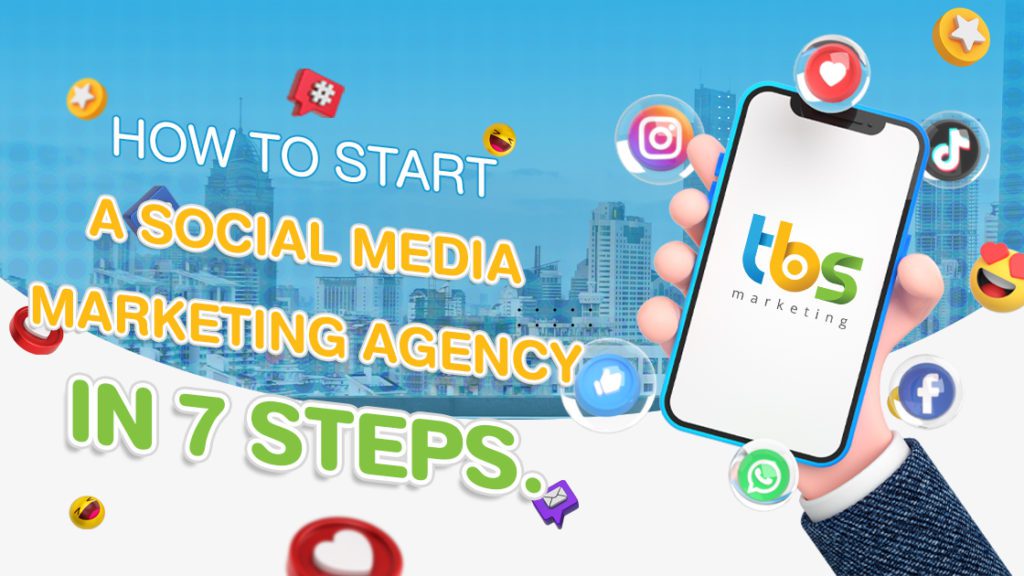
In today’s digital world, social media platforms wield an incredible influence. Many businesses, regardless of their size, are actively leveraging these platforms, creating a ripe landscape for social media marketing agencies.
Wondering how to build your own social media marketing agency from scratch? This 7-step guide is here to help.

Why Start a Social Media Marketing Agency?
Starting a social media marketing agency can be a rewarding venture in the current digital landscape. This business can help brands enhance their online presence, increase their sales, and boost brand recognition. Whether it’s established firms like Apple or emerging brands like Beyond Meat, they all leverage social media marketing strategies, presenting opportunities for agencies to make a real impact.
Here are the steps to guide you in establishing a thriving social media agency.
1. Define Your Niche
Before you dive into the world of social media marketing, it’s crucial to define your niche. Pinpoint which sectors or types of businesses you want to cater to, and familiarise yourself with platforms like Facebook, Instagram, Twitter, LinkedIn, and their unique demographics.
For example, if you specialize in providing social media marketing services for e-commerce businesses, you can focus on developing expertise in driving online sales and increasing brand visibility through platforms like Facebook, Instagram, and Twitter. Knowing the best post times on Instagram is crucial for maximizing engagement and reach, especially if you specialize in providing social media marketing services for e-commerce businesses
If you’re in the retail industry, the first thing you’d do is some market research. You want to figure out which specific sectors and businesses within retail match your expertise. After that, it’s time to dive into the demographics and user behaviour of social media platforms like Facebook, Instagram, Twitter,LinkedIn, and emerging platforms like Tik Tok. With all that information, you can start crafting personalised marketing strategies.

2.Find Your Own Brand’s Voice and Persona
As you embark on this journey, it’s essential to establish your own brand’s voice and persona. Your Unique Selling Proposition (USP) should convincingly explain why clients should pick your agency over the competition. Crafting a compelling brand voice and persona can also make your agency more relatable and attractive to potential clients.

3.Build Your Own Social Media Presence
To start a social media marketing agency with no experience, focus on building your own robust social media presence first. By doing so, you can gain practical experience and create a portfolio that showcases your skills, creativity, and understanding of various platforms.
4.Develop Social Media Marketing Strategies
Your agency should provide clients with effective social media marketing strategies. These should outline clear goals, the right platforms for their business, and engaging content ideas.
Below are a few notable examples of effective social media marketing strategies:
Strategy Development: Craft customised social media strategies tailored to each client’s specific goals, target audience, and industry. Define clear objectives, tactics, and key performance indicators (KPIs) to guide the overall campaign.
Content Creation and Management: Create compelling and relevant content for clients’ social media platforms. This entails crafting engaging captions, designing visually appealing graphics or videos, and scheduling posts to ensure consistent and timely content delivery.

Paid Social Advertising: Implement targeted paid advertising campaigns on social media platforms to increase clients’ reach and engagement. Develop strategic ad campaigns, optimise ad performance, and closely monitor results to maximise return on investment (ROI).
Analytics and Reporting: Utilise analytics tools to track and analyse the performance of clients’ social media campaigns. Provide regular reports that highlight key metrics, insights, and actionable recommendations for optimisation and improvement.
Community Management: Actively engage with clients’ social media communities by responding to comments, messages, and inquiries. Foster positive interactions, build relationships with followers, and effectively manage any issues or concerns that may arise.
Audits and Assessments: Conduct regular audits of clients’ social media accounts to assess performance, identify areas for improvement, and uncover growth opportunities. Offer actionable recommendations based on findings to enhance overall social media effectiveness.
Influencer Partnerships: Explore collaborations with relevant influencers to promote clients’ brands or products. Identify suitable influencers, negotiate partnerships, and manage influencer campaigns to leverage their reach and influence within the target audience.
In addition,staying updated with emerging social media trends in 2023 is crucial to aligning your social media strategies and staying ahead in the ever-evolving digital landscape.
- Short-Form Video Dominance: Short-form video content continues to reign supreme in the social media landscape. Platforms like TikTok and Instagram Reels have popularised this format, and brands and creators will leverage its power to engage and entertain audiences effectively.

- Social Commerce Expansion: Social commerce is expected to experience significant growth as social media platforms enhance their e-commerce functionalities. The ability for users to discover, shop, and make purchases seamlessly within the platform will drive increased revenue and provide a convenient shopping experience for consumers.
- Empowerment of Content Creators: Content creators will continue to hold considerable influence and power in the social media realm. Brands will recognise the value of collaborating with creators to leverage their authentic voices and dedicated fanbases, enabling them to reach and engage with their target audience more effectively.
5.Nurture your Existing Clientele
Nurturing existing clients is crucial when starting a social media agency as it fosters long-term relationships,builds trust, and encourages client satisfaction.
- Personalise Your Approach: Tailor services to their industry, audience, and objectives.
- Proactive Relationship Management: Take initiative, offer insights, and go beyond the scope of services.
- Communication is Key: Establish open and transparent channels to address their needs and provide updates
- Deliver Exceptional Results: Focus on generating measurable results and provide regular performance reports.
- Continual Learning and Innovation: Stay updated with the latest trends and bring fresh ideas to the table.
- Build Trust and Credibility: Be honest, reliable, and proactive in addressing challenges.
- Regular Performance Reviews: Assess progress, gather feedback, and adjust strategies accordingly.
- Value-added Services and Insights: Offer additional analyses, research reports, and strategic recommendations.
- Foster Long-term Relationships: View each client engagement as a long-term partnership and celebrate milestones together.

6.Create Proposals and Contracts for Your Potential Clients
Next, prepare comprehensive proposals and contracts for your potential clients. These should clearly outline your services, deliverables, timelines, and pricing structure. Your proposal will be a key tool in securing clients, so it’s crucial to make it professional and persuasive. More importantly, a well-thought-out social media strategy proposal should be custom-made for each client’s needs and objectives.
Pricing strategies play a crucial role in the success of social media agencies. Here are some key pricing strategies that social media agencies can consider:
- Packaged Services: Bundling services together at a fixed price based on different tiers or levels of service.
- Value-Based Pricing: Setting prices based on the perceived value clients receive from the services provided.
- A La Carte Pricing: Allowing clients to choose and pay for individual services or components.
- Retainer Pricing: Setting a fixed monthly fee for a specified scope of work over an extended period.
- Performance-Based Pricing: Tying compensation to the achievement of specific performance metrics or goals.
- Customised Pricing: Developing tailored pricing models to accommodate unique client requirements or complex projects.

7. Build your Portfolio
Lastly, building a strong portfolio is essential to showcase your agency’s capabilities and attract potential clients. Continuously update your portfolio with completed projects, including client testimonials or case studies that highlight the successful outcomes and the value you provided to your clients. This demonstrates your experience and the reasons why potential clients should choose your agency.
Transitioning into Social Media Management
As your agency matures, consider expanding into social media management. While related to marketing, management emphasises maintaining and building a brand’s online reputation. Offering this as a service can be an effective way to retain clients and foster long-term relationships.
Network and Develop Partnerships
To scale your agency, it’s beneficial to network extensively and form partnerships with other businesses for mutual promotion. You should also focus on hiring talented staff and invest in their continuous training.
To build a successful social media agency, attract the right talent by defining job roles and leveraging social media platforms for recruitment. Prioritise work-life balance and create a supportive environment to prevent burnout. Invest in training, identify key roles, foster a positive workplace, implement performance evaluations, and offer competitive compensation. These steps will help you establish a strong foundation and thrive in the social media industry.
Conclusion
Launching a social media marketing agency might seem daunting, but with strategic planning, a deep understanding of social media trends, and the willingness to adapt, you can create a thriving business in this dynamic digital realm.
Embarking on this journey might seem challenging, but with this roadmap, you are well-equipped to make your mark. Good luck!
